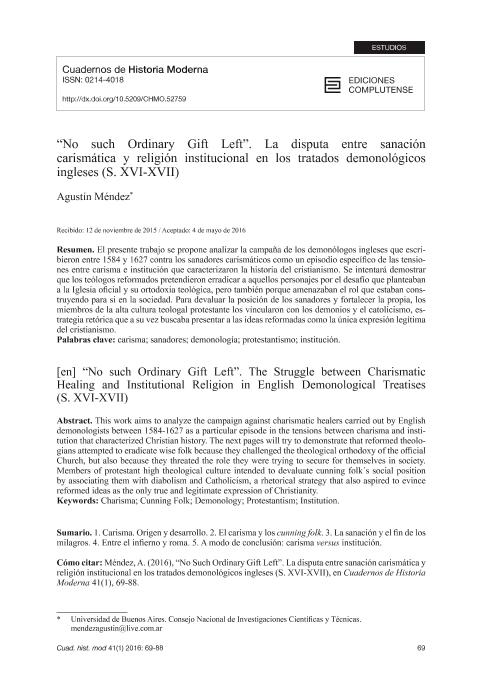Artículo
El presente trabajo se propone analizar la campaña de los demonólogos ingleses que escribieron entre 1584 y 1627 contra los sanadores carismáticos como un episodio específico de las tensiones entre carisma e institución que caracterizaron la historia del cristianismo. Se intentará demostrar que los teólogos reformados pretendieron erradicar a aquellos personajes por el desafío que planteaban a la Iglesia oficial y su ortodoxia teológica, pero también porque amenazaban el rol que estaban construyendo para si en la sociedad. Para devaluar la posición de los sanadores y fortalecer la propia, los miembros de la alta cultura teologal protestante los vincularon con los demonios y el catolicismo, estrategia retórica que a su vez buscaba presentar a las ideas reformadas como la única expresión legítima del cristianismo. This work aims to analyze the campaign against charismatic healers carried out by English demonologists between 1584-1627 as a particular episode in the tensions between charisma and institution that characterized Christian history. The next pages will try to demonstrate that reformed theologians attempted to eradicate wise folk because they challenged the theological orthodoxy of the official Church, but also because they threated the role they were trying to secure for themselves in society. Members of protestant high theological culture intended to devaluate cunning folk´s social position by associating them with diabolism and Catholicism, a rhetorical strategy that also aspired to evince reformed ideas as the only true and legitimate expression of Christianity.
"No such Ordinary Gift Left". La disputa entre sanación carismática y religión institucional en los tratados demonológicos ingleses (S. XVI-XVII)
Título:
“No such Ordinary Gift Left”. The Struggle between Charismatic Healing and Institutional Religion in English Demonological Treatises (S. XVI-XVII)
Fecha de publicación:
06/2016
Editorial:
Ediciones Complutense
Revista:
Cuadernos de Historia Moderna
ISSN:
0214-4018
Idioma:
Español
Tipo de recurso:
Artículo publicado
Clasificación temática:
Resumen
Palabras clave:
CARISMA
,
SANADORES
,
DEMONOLOGIA
,
PROTESTANTISMO
Archivos asociados
Licencia
Identificadores
Colecciones
Articulos(SEDE CENTRAL)
Articulos de SEDE CENTRAL
Articulos de SEDE CENTRAL
Citación
Mendez, Agustin; "No such Ordinary Gift Left". La disputa entre sanación carismática y religión institucional en los tratados demonológicos ingleses (S. XVI-XVII); Ediciones Complutense; Cuadernos de Historia Moderna; 41; 1; 6-2016; 69-88
Compartir
Altmétricas




